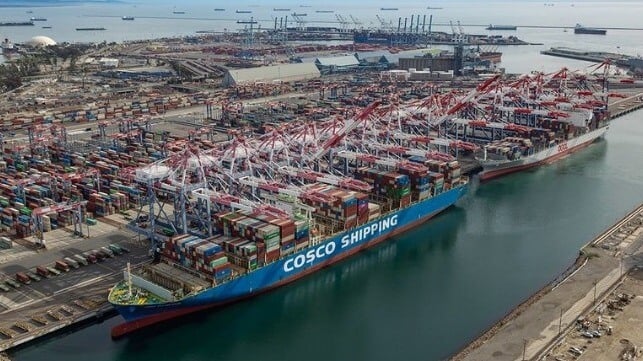China Amends Maritime Regulations Ahead of USTR Fee Implementation

Just two weeks ahead of the scheduled start of the U.S. Trade Representative’s plan to impose fees on Chinese-built, owned, or operated vessels calling at U.S. ports, the Chinese government announced changes to its 2001 International Maritime Transport Regulations. While it is the fifth time the regulations have been updated in the past 24 years, it is widely seen as a response to the U.S. fees and a further complication in the international trade talks.
Chinese officials have repeatedly said they would respond to actions that threaten Chinese trade. Xinhua, the Chinese state news agency, announced that Chinese Premier Li Qiang immediately signed a decree from the State Council on September 28. Among the changes are the ability to take “countermeasures against countries that impose of support discriminatory bans, restrictions, or similar measures targeting Chinese operators, vessels, or crew engaged in international maritime transport and related services.”
The text of the decree posted to the Chinese government website reads, “If any country or region adopts, assists or supports the adoption of discriminatory prohibitions, restrictions or other similar measures against operators, ships or crew members of the People’s Republic of China engaged in international maritime transport and its ancillary services, the government of the People’s Republic of China shall, unless relevant treaties and agreements can provide sufficient and effective remedies.”
China says its actions could include charging special fees to ships of that country or region berthing at Chinese ports, prohibiting and or restricting ships of that country or region from entering or leaving Chinese ports. It could also prohibit or restrict organizations and individuals of that country or region from obtaining data and information related to China’s international maritime transport, and operating international maritime transport and its ancillary services entering and leaving Chinese ports.
Another provision requires international shipping operators to submit information “such as the operator's name, place of registration, contact information, platform service agreement, and shipping transaction rules to the transportation department of the State Council.” The revised decree also provides the power to charge a fee of between approximately $2,800 and $14,000 if a company does not provide the required information. It further establishes that “if the circumstances are serious, it shall be ordered to cease conducting relevant business."
The U.S. Trade Representative released is April its plan to impose fees in response to a complaint from five unions that asserted China was unfairly dominating shipbuilding and maritime trade. Finding that China had unfair business practices, the U.S. said it would impose fees on Chinese-flagged operators calling in the U.S., ships owned by Chinese investors, and ships built by Chinese shipyards. Other parts of the fee proposal target Chinese-made port cargo cranes, international car and vehicle carriers regardless of their nationality, and the U.S. LNG export trade.

that matters most
Get the latest maritime news delivered to your inbox daily.
The moves are part of a series of consequential initiatives all expected to reach decision points during October. Experts, however, point out that the U.S. is yet to finalize the rules, respond to industry questions, and formalize the plan for the collection of the fees. The USTR and Customs and Border Protection (CBP) are expected to release documentation ahead of the October 14 scheduled start of the fees.
China’s state carrier COSCO Shipping and its subsidiary OOCL have admitted that the fees would impact their business but have said they remain committed to their operations. Many international carriers, including MSC, Maersk, CMA CGM, ONE, have all said they would be adjusting deployments and expected to avoid most of the fees. Investors and vessel owners/operators are considering other responses as greater clarity emerges on the fee structure and the potential for legal challenges remains, although none have yet been filed.
